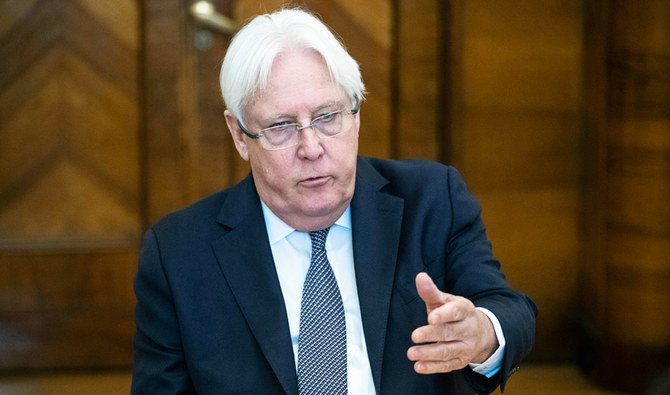
- ARAB NEWS
- 09 Jul 2025

Saeed Al-Batati
AL-MUKALLA: The UN envoy to Yemen, Martin Griffiths, has told Arab News that the escalation in fighting and shelling throughout Yemen has derailed his efforts for resuming talks between warring factions.
“It has pushed back our plans for the resumption of the peace process and showed us the fragility of all gains toward peace,” he said in an exclusive interview with Arab News.
“I have told the parties publicly and privately that peace will not be dictated from a position of military dominance,” he added, urging Yemenis to concentrate efforts on fighting the spread of coronavirus. “Now, even more than ever, with the coronavirus disease (COVID-19) posing an existential threat to Yemen, they must urgently silence the guns and work jointly to combat the common enemy.”
The UN envoy said he appreciated the Kingdom’s support to his mission in Yemen and its swift engagement with the organization’s call for a truce.
“I am grateful to the Kingdom of Saudi Arabia and to Crown Prince Mohammed bin Salman for his concrete actions of supporting my initiative to comprehensively end the war such as the unilateral cease-fire and concrete gestures to help bring the parties to the conflict closer.”
When the UN appointed Griffiths as its new envoy Yemen in January 2018, he was hailed as a veteran negotiator who could use his “extensive experience in conflict resolution, negotiation, mediation and humanitarian affairs” to end the war.
In 2019, like many Yemen observers, the UN envoy said that he thought the country was moving toward peace as fighting largely decreased, as the Riyadh Agreement had defused tensions in Aden.
“We could see a positive trend, particularly in the reduction of the military activities, which was creating a conducive environment for peace talks to begin. The signing of the Riyadh Agreement was another factor that made me and all of us more hopeful as it was directing the formation of a more inclusive new government delegation,” Griffiths said.
Other positive signs were the advances in prisoner exchanges and allowing ships into Hodeidah port. These changes were “signaling that the parties were able to find commonalities and not only differences,” the envoy said.
Despite the escalating violence, the UN envoy said warring factions’ positive responses to the UN call for a truce and the public support for halting fighting boosted his hope for reviving peace.
“There is a real opportunity for peace in Yemen. All warring parties responded publicly and positively to the UN secretary-general’s call for a nationwide cease-fire in Yemen.
“Also, remarkably, there has been an outpouring of public support for a cease-fire, including from civil society organizations, youth and women groups, political parties and tribal networks. It has inspired and encouraged us to push harder and aim higher.”
Yemen is enduring the world’s worst humanitarian crisis. Most of the country’s population is in desperate need of assistance. The situation, Griffiths warned, is expected to worsen with the emergence of COVID-19 and more fighting. “We are running out of time. And all the good work the UN humanitarian agencies and NGOs do on the ground to address the situation will not be enough if there is no end to the war,” he said.
The internationally recognized government and many rights groups usually criticize UN envoys for not strongly shaming the Iranian-backed Houthis for their violence. “I have explicitly condemned all attacks, including the attack on Taiz Central Prison that killed several women and children, as well as the attacks in Marib and elsewhere,” he said, adding: “Besides public condemnation, I use my leverage with the parties to ease the situation when possible. For example, following the deplorable and outrageous death sentences against four journalists in Sanaa, my office has been insisting in the negotiation with the parties to include them in the list of detainees to be released in the upcoming exchange.”
At the moment, Griffiths is seeking to convince Yemeni parties to accept the UN proposal for a nationwide truce, initiating measures to alleviate economic and humanitarian strife and a commitment to resume peace talks. “The parties have engaged with the proposal and sent several substantive revisions that we have reviewed and sent back amended versions accordingly to bridge the outstanding differences where they exist. Regular and detailed negotiations are ongoing, and it is my hope that this agreement will be concluded soon.”
The envoy believes the proposal would set the stage for a comprehensive peace settlement that would address key issues such as the constitution, elections and the grievances of the southerners. He said it would eventually prevent further relapses into violence.
“This agreement would provide the foundation for a broader process to build real and sustainable peace in Yemen that protects it from a future violence. This requires commitment from Yemenis. The public vocal advocacy for peace reassures me that the people of Yemen are ready to take on this task.”
Griffiths said that recent violence in the western city of Hodeidah after the death of the government’s liaison officer has impeded the implementation of the Stockholm Agreement.
Griffiths expressed his frustration with slow progress on prisoner-related issues under the deal. “The progress on this issue has been frustratingly slow. Yemenis have every right to expect the parties to fulfill that commitment they made over a year ago. I am heartened and grateful for the vocal advocacy of so many civil society organizations and women’s networks about this issue.”
“The signing of the Riyadh Agreement and its implementation under the auspices of the coalition is an important step for the inclusivity of the peace process,” he said.